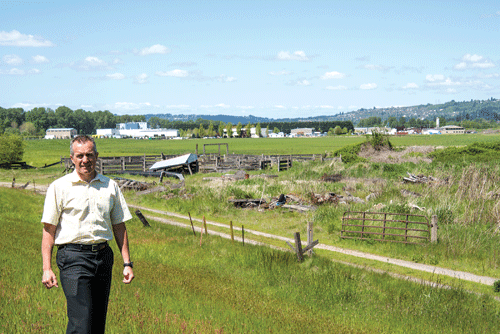
A safe and sane ordinance would have outlawed things like aerial spinners, Roman candles, aerial reloadable tubes and mine/shell devices for the 2013 Independence Day holiday and beyond. With the Monday night vote, however, there will be no changes until 2014 at the earliest.
At the Fort Vancouver National Trust, owners of 14 licenses to operate fireworks stands in Clark County – eight of them within the city of Vancouver – news of the ordinance’s failure was met with appeasement.
As Trust President and CEO Elson Strahan explained it, the Trust works with fireworks suppliers and partners with other nonprofit organizations to run its fireworks stands. Those nonprofits then receive a portion of the fireworks sales, while the Trust receives approximately $120,000 in total revenue each year from its 14 stands.
“We were certainly watching this [ordinance] with intrigue,” said Strahan. “For the nonprofit organizations that run a stand within the city and depend on that particular stand exclusively, the ordinance would have had – at least within their estimation – a very dampening effect on profitability.”
In 2004, the Trust calculated that revenue generated from their fireworks stands by nonprofit organizations in the city of Vancouver and in Clark County worked out to more than $5 million.
“The revenue is substantial,” Strahan noted. “The organizations that run these stands really do generate a lot of money for their programs and their cause.”
Had the ordinance passed, Strahan explained, the effect may have simply been to shift sales from the city stands to more of the county stands. But even business owners that would seem to benefit from city fireworks restrictions said they were worried about the ordinance.
“Immediately, it (the ordinance) wouldn’t have affected me because I would still be able to sell that [banned] stuff,” said Frank McKay, owner of Blackjack Fireworks, which rests outside of Vancouver’s city limits. “But it seems to me that once the city does something, the county tends to follow suit a year or two later. So yeah, it’s worrisome when it comes down to a vote.”
Both McKay and Strahan said they understood many of the concerns supporters of the ordinance had, such as fireworks misuse and public safety. However, each expressed doubts as to how the proposed restrictions could be enforced.
“People commonly think of a city where you draw this big circle around an urban area and everything outside the circle is the county and inside is the city, but of course it’s not that neat or simple. Hazel Dell, for example, is not incorporated as part of the city,” said Strahan.
“No matter what you do, if people want their fireworks they’re going to get them,” added McKay. “If they ban them in the city, people will get them in the county. If they don’t get them in the county because they ban fireworks there, they’re going to get them in the next county over. And they’re not going to ban fireworks in Woodland, because they like the revenue.”







